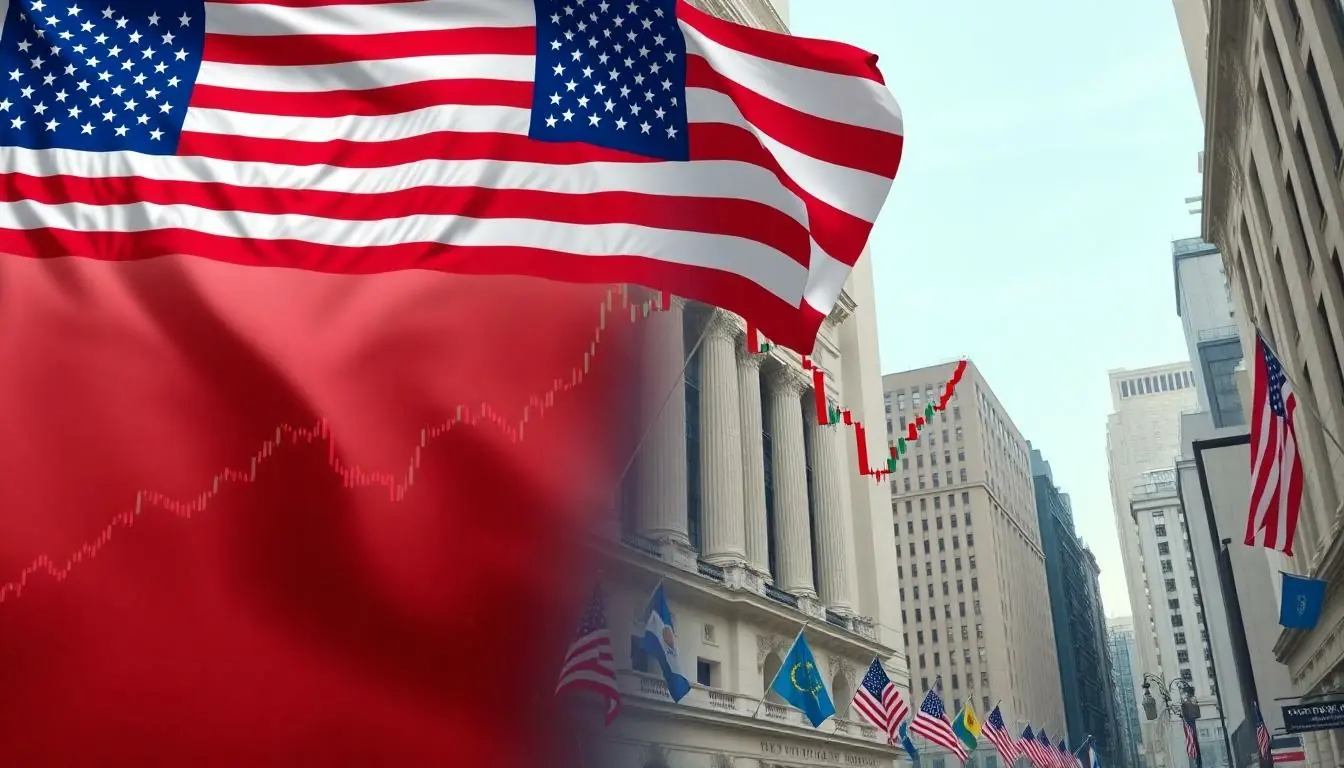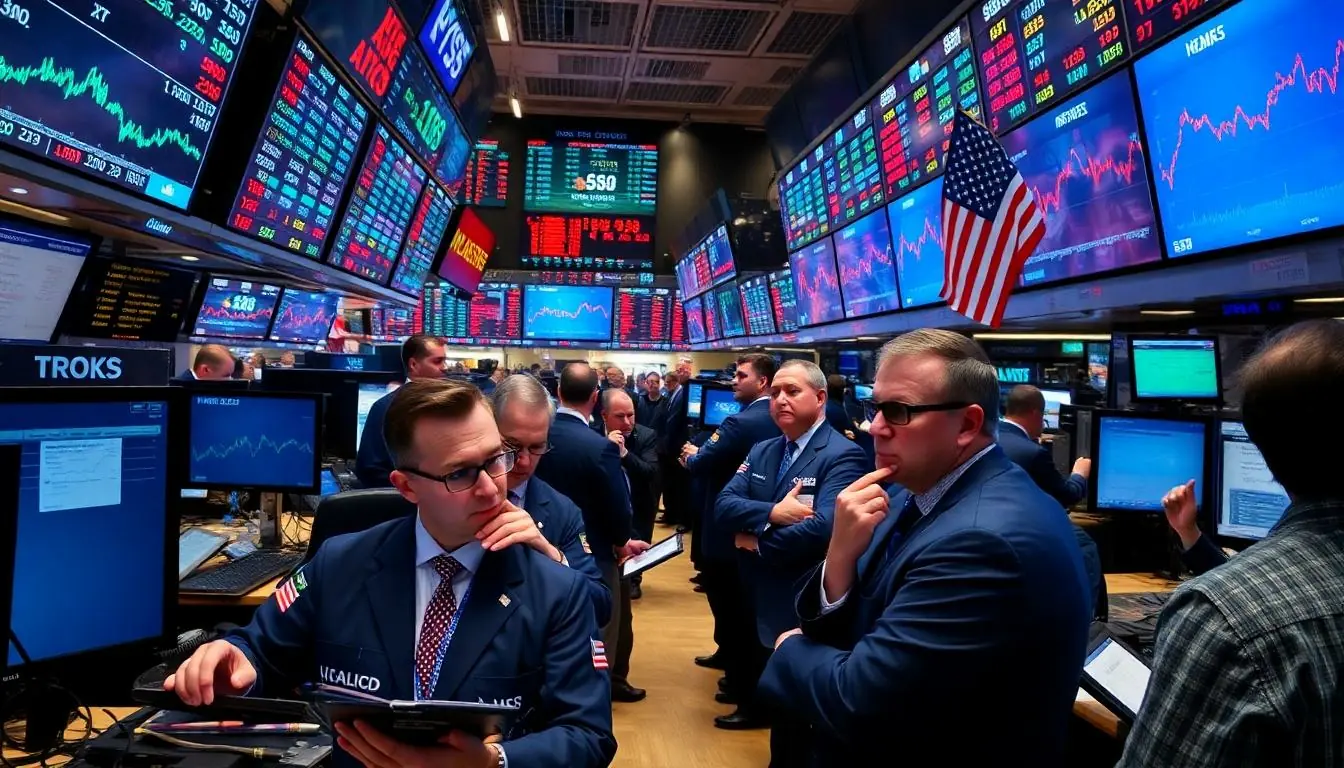When it comes to investing, folks often wonder which political party holds the golden key to a thriving stock market. Is it the party that promises tax cuts or the one that champions social programs? The debate can feel like a never-ending game of hot potato, with opinions flying faster than stock prices on a bullish day.
Understanding the impact of political parties on market performance isn’t just for the financial wizards in suits. It’s crucial for everyday investors too. After all, who wouldn’t want to know if their portfolio’s fate rests in the hands of a donkey or an elephant? Buckle up as we dive into the colorful world of politics and stocks, exploring which party might just give your investments the boost they need.
Table of Contents
ToggleOverview of Political Parties and the Stock Market
The relationship between political parties and stock market performance varies significantly across different administrations. Democratic and Republican parties often present contrasting economic strategies, which can influence market stability and growth.
Democratic policies frequently emphasize social programs, including healthcare reforms and increased regulation. These strategies aim to reduce economic inequality but may introduce uncertainty for investors concerned about potential tax increases. Historical data indicates that during Democratic presidencies, average annual stock market returns have been less pronounced compared to their Republican counterparts.
Conversely, Republican parties typically advocate for tax cuts and deregulation. Such policies generally appeal to investors as they signal a pro-business environment. Trends show that the stock market tends to perform optimally during Republican administrations, with higher average returns noted over extended periods.
Market analysts often assess economic indicators in conjunction with party policies. They observe that the potential for government spending can stimulate certain sectors while creating volatility in others. Energy, finance, and technology sectors may behave differently based on the ruling party’s stance and policy direction.
Recognizing party dynamics is crucial for investors. Individual portfolios may experience varied performance based on political climate. Investors often align their expectations with the governing party’s economic agenda, making it essential to remain informed about ongoing changes in leadership and policy.
Understanding these nuances aids in comprehending how political parties can shape market trajectories. Individual investors should critically evaluate the performance of their holdings in light of potential designations from either party, as these factors significantly impact investment decisions.
Historical Performance of Stock Markets Under Different Parties

The political party in power significantly impacts stock market performance. Examining the historical data reveals trends associated with each party’s policies.
Democratic Party
Democratic administrations often prioritize social programs and increased regulation. This focus can lead to uncertainty in the market, causing lower average annual returns. For instance, from 1933 to 2021, the S&P 500 averaged about 10.7% annual returns under Democratic presidents. Market participants may respond cautiously to proposed tax increases or stricter regulations, leading to reduced investor confidence. Economic growth during these administrations can vary, affecting specific sectors differently. Overall, while some segments thrive, the broader market outlook might seem less favorable compared to Republican leadership.
Republican Party
Republican governance generally favors tax cuts and deregulation, fostering a favorable environment for investors. Historically, the S&P 500 has seen average annual returns of around 14.2% under Republican presidencies from 1933 to 2021. This pro-business stance can stimulate market growth and attract investments. Additionally, lowered corporate taxes often encourage increased spending and expansion within companies. Such policies lead to heightened investor optimism, which can drive stock prices higher. Overall, Republican policies tend to create a landscape where market performance remains robust, benefiting many sectors in the economy.
Economic Policies Impacting the Stock Market
Economic policies significantly influence stock market performance. Understanding these impacts helps investors make informed decisions as political landscapes change.
Taxation Policies
Taxation policies often shape investment landscapes. Democratic administrations, focusing on tax increases for funding social programs, may result in reduced investor confidence. Lower corporate taxes under Republican leadership stimulate business growth, leading to increased capital investment. Historical data reveals that average annual returns were approximately 10.7% during Democratic presidencies compared to 14.2% during Republican terms. These statistics highlight investors’ responsiveness to tax policies, which directly affect market dynamics.
Regulation and Deregulation
Regulation and deregulation play crucial roles in determining market environments. Democratic policies typically involve increased regulation, which may introduce uncertainty. Increased compliance costs can deter investments, particularly in industries heavily influenced by government oversight. Conversely, Republican policies favor deregulation, often promoting business expansion and attracting investment. With fewer restrictions, companies find more opportunities to innovate and grow. Market analysts note that deregulated environments tend to foster higher stock market returns, reinforcing the connection between political choices and financial performance.
Investor Sentiment and Political Environment
Investor sentiment often shifts with the political climate. Market reactions frequently occur following major news events or policy announcements. For instance, stock prices may dip after Democrats propose tax increases, reflecting concerns about profitability. In contrast, Republican tax cuts tend to boost market confidence, leading to stock rallies. Historical data supports that the S&P 500 averages 14.2% annual returns under Republican presidents, showcasing investor optimism in a pro-business environment. Additionally, political instability can create volatility, as investors reassess risks tied to regulation and taxation.
Market Reactions to Political News
Market responses to political news are significant and immediate. Announcements regarding tax changes can lead to market fluctuations, impacting investor strategies. A proposal for increased corporate taxes often results in downward pressure on stock prices. Similar consequences arise when news of new regulations surfaces, instigating concerns about compliance costs. Conversely, tax cuts or deregulation measures from the Republican party typically invigorate markets, prompting positive movement in stock prices. Historically, volatility spikes during election cycles as investors react to potential leadership changes, emphasizing the need for vigilance regarding political developments.
Influence of Partisan Control
Partisan control profoundly influences market dynamics. Companies anticipate different regulatory environments depending on which party holds power. Democratic leadership may usher in stricter regulations that alter operational costs for businesses, potentially dampening market performance. Republican leadership bolsters investor confidence by prioritizing tax breaks and reducing regulations, generally resulting in a more favorable economic landscape. Research indicates lower corporate tax rates under Republican presidencies correlate with heightened capital investment. This correlation often stimulates market growth, attracting both domestic and international investors. Hence, understanding the prevailing party’s stance aids investors in making informed decisions aligned with market expectations.
Determining which political party is better for the stock market isn’t straightforward. Each party’s policies shape investor sentiment and market dynamics in unique ways. Republican administrations often create a more favorable investment climate through tax cuts and deregulation, leading to higher average returns. Conversely Democratic policies may introduce uncertainty due to increased regulation and tax hikes, impacting market performance.
Investors must remain vigilant and adapt to the political landscape. Understanding how party policies influence market conditions can empower investors to make informed decisions. Ultimately, staying informed about political developments is essential for navigating the complexities of the stock market.







